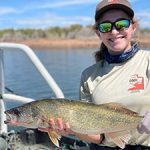Native Fisheries Crew Leader – Wildlife Technician II
Opening date: Dec. 20, 2023
Closing date: Jan. 9, 2024
Salary: $16.67–$23.30/hour
Location: Moab Field Station, 1165 S. Hwy 191 Suite #4, Moab, UT 84532
Start/end dates: March 1–Nov. 30, 2024 (not to exceed 1,560 hours)
Positions available: one
Housing: Not provided
The Utah Department of Natural Resources, Division of Wildlife Resources, is seeking a seasonal crew leader (no benefits) at the Moab Field Station in Moab, Utah. This position will begin in early March and conclude in November (not to exceed 1,560 hours). Housing is not provided, although food, tents, sleeping pads, dry bags, PFDs and camping gear are supplied during overnight fieldwork.
Job duties
The Moab Field Station conducts various field projects to research, monitor and manage native and endangered fishes on the Green, Colorado and San Juan Rivers as well as Lake Powell. This position will assist with all field efforts, including collecting field data on native and nonnative fish populations using raft and jon boat electrofishing, seines, trammel nets, hoop nets, larval light traps, and submersible PIT antennas.
Additionally, the crew leader will participate inand lead (when necessary) trip preparation and clean-up, warehouse organization, menu preparation, training and orientation of new crew members, data collection and entry, and public outreach activities. The crew leader will often perform as the lead operator on whitewater rafts and motor boats, and must be proficient with boat navigation, sampling techniques, data collection, fish identification and PIT tagging.
Job requirements and skills
This is an outdoor, field-based position. Applicants must be willing to work a highly variable schedule under harsh and adverse conditions. Applicants must be capable of performing physically demanding tasks and working outdoors in very hot, cold, and/or inclement weather. Field trips range from three to ten days in length in remote river canyon locations, often with little to no cell service and no ability to return home at night. Applicants must be agreeable to mechanical removal of nonnative fish. Applicants are required to be over 18 years of age, possess a valid driver’s license, and provide proof of citizenship.
Desired qualifications include experience and proficiency with fisheries fieldwork, specifically accurate data collection, desert fish identification and handling, PIT tagging, ability to follow complex sampling protocols, whitewater rowing (up to class IV), motorized boat operation and maintenance, boat-mounted electrofishing, fish netting and seining. Qualified applicants should also have leadership experience, strong verbal and written communication skills and experience working as a member of a large team in adverse field conditions. An applicant will only be considered if their resume clearly demonstrates these qualifications. Preference will be given to applicants possessing familiarity with Moab Field Station sampling reaches, projects, equipment and protocols. Additional preference will be given to applicants possessing a degree in the natural sciences, wilderness medical certification, and/or swift water rescue certification.
Applications
Resumes and cover letters may be emailed to katherinecreighton@utah.gov.
For more information, contact Katie Creighton (Native Aquatics Project Leader) at katherinecreighton@utah.gov or call 435-259-3780.
DNR complies with the ADA. Hearing-impaired employees who wish further information regarding this announcement may call the DNR TTY number at 801-538-7458. Disabled employees who desire reasonable accommodation in the interview process should contact the DNR Human Resources Office at 385-315-2834.
People and culture expectation
The successful applicant(s) will be expected to uphold the Division’s values of integrity, professionalism, accountability, teamwork and cooperation. The behaviors they embrace should set an example of professional and personal respect. Seasonal employees are expected to actively promote a workplace free of discrimination and harassment, as well as make good faith efforts to understand people as unique individuals with diverse life experiences, challenges and opportunities.